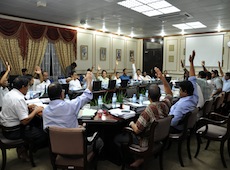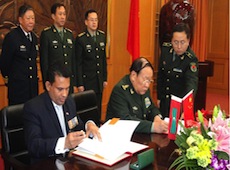The trial of former President Mohamed Nasheed on charges of illegally detaining a judge appears to be a politically motivated attempt to bar the Maldivian Democratic Party (MDP) candidate from the 2013 presidential election, the Bar Human Rights Committee (BHRC) concluded in a report launched on Thursday (December 13).
The report was compiled by Stephen Cragg on behalf of the BHRC, the international human rights arm of the Bar of England and Wales, following a visit to the Maldives from November 3 to 6 to observe hearings of former President Nasheed’s trial.
“BHRC notes that Mr Nasheed’s lawyers have petitioned the prosecutor-general to review whether the prosecution of Mr Nasheed is in the public interest, and it seems to BHRC that this is an application worthy of very serious consideration,” the report stated.
“BHRC is concerned that a primary motivation behind the present trial is a desire by those in power to exclude Mr Nasheed from standing in the 2013 elections, and notes international opinion that this would not be a positive outcome for the Maldives.”
According to a press release by the BHRC, the report was based on “an investigation into the circumstances surrounding the trial of ex-President Mohamed Nasheed.” The BHRC observer, Stephen Cragg, is a member of the bar and barrister at Doughty Street Chambers.
Former President Nasheed faces criminal charges for the military’s controversial detention of Chief Judge of the Criminal Court Abdulla Mohamed on January 16 this year.
Home Minister Hassan Afeef sought to justify the arrest at the time on the grounds that the judge was a national security threat after he blocked investigation of his misconduct by the judicial watchdog and quashed a police summons for him.
The judge had “taken the entire criminal justice system in his fist,” Afeef said, accusing Abdulla Mohamed of obstructing high-profile corruption cases, releasing murder suspects, colluding with drug traffickers, and barring media from corruption trials.
Judge Abdulla “hijacked the whole court” by deciding that he alone could issue search warrants, Afeef contended, and had arbitrarily suspended court officers.
In the conclusions of the BHRC report, the author observed that the detention of the judge was “not a simple case of abuse of power.”
“Rather, the underlying narrative of the situation is that of a president desperate to bring change to a new democracy after decades of oppression, and finding himself thwarted by the inability of the organs of state set up by the constitution to deliver much needed reform,” the report stated.
Referring to “the large number of international reports” that have found the Maldivian judiciary to be flawed, the BHRC noted that the Judicial Service Commission (JSC) “failed in its twin tasks of ensuring that the judiciary has the appropriate experience and qualifications, and in bringing to book the judges who fail to fully and fairly implement the rule of law.”
“Implicit in these criticisms is that Mr Nasheed cannot be guaranteed a fair trial,” the report concluded.
The BHRC also expressed concern with the “deterioration of human rights protection in the Maldives since the transfer of power in February 2012” as reported by Amnesty International and the International Federation of Human Rights (FIDH).
“Again, a failure to comply with human rights standards by the Maldivian authorities is a grave threat to the democracy so recently achieved,” the report stated.
“How the Maldives deals with this prosecution and trial (if it goes ahead) may well decide the course of its government for years to come.”
Back in September, the government criticised Amnesty International’s report, “The Other side of Paradise: A Human Rights Crisis in the Maldives”, as being “one sided”.
The BHRC is a UK-based independent body “concerned with protecting the rights of advocates, judges and human rights defenders around the world.”
JSC and failure of oversight
The BHRC report also noted that article 285 of the constitution mandated the JSC to determine whether or not the judges on the bench possessed “the educational qualifications, experience and recognized competence necessary to discharge the duties and responsibilities of a judge, [and] high moral character.”
“However, the JSC failed to bring in any standards in the two years allowed and in August 2010 almost all judges, good and bad, were re-instated in post at that point amidst much controversy,” the report observed.
It added that the International Committee of Jurists (ICJ) expressed concern with the JSC’s failure to “fulfil its constitutional mandate of proper vetting and reappointment of judges.”
“The JSC (made up of politicians, lawyers and judges) has also been criticised as ineffective in its other role of overseeing complaints about judges. Complaints about the worst judges built up and were not investigated. A large number of complaints were made about the head of the criminal court in Malé, Judge Abdulla Mohamed,” the BHRC report explained.
“In an open letter to parliament in March 2011, former President Nasheed’s member on the JSC and outspoken whistle-blower, Aishath Velezinee, claimed that the politically-manipulated JSC was protecting Judge Abdulla.
She claimed this protection was provided despite the existence of “reasonable proof to show that Chief Judge of the Criminal Court Abdulla Mohamed was systematically committing the atrocity of setting free dangerous criminals and declaring them innocent with complete disregard to the evidence [presented at court].”
Despite Judge Abdulla having been sentenced for a criminal offence, Velezinee wrote that Speaker Abdulla Shahid pushed for his reappointment and later “bequeathed the Criminal Court to Abdulla Mohamed until 2026″ under the Judges Act, which was passed hastily during the constitutional crisis period in July-August 2010.
Velezinee meanwhile told the author of the BHRC report that it was “the State’s duty to remove [Judge Abdulla] from the judiciary”.
“She has written a remarkable memoir of her time on the JSC, describing the machinations and tribulations of the Committee, and its failure to establish ethical or moral standards for judges,” the report noted.
Meanwhile, on January 16, 2012, “frustrated by an inability to remove allegedly bad judges, President Nasheed (or one of his ministers, it is still not entirely clear) ordered the detention of Judge Abdulla,” the BHRC report continued.
“He was taken to an island and kept there for almost three weeks, despite the protests of lawyers and judges. It does not seem that he was badly treated, and the government emphasised the lack of other effective powers to justify its actions.”
It added that the Supreme Court demanded the immediate release of the judge “as he was arrested not in conformity with the laws and regulations, and the acts of MNDF [Maldives National Defence Force] was outside its mandatory power.”
The trial
Former President Nasheed’s trial is set to resume after the Supreme Court on December 5 decided in a 4-3 ruling that the Hulhumale’ Magistrate Court hearing the case was legitimate.
The BHRC report noted that Nasheed was charged under article 81 of the penal code, which states: “It shall be an offence for any public servant to use the authority of his office to intentionally arrest or detain any innocent person in a manner contrary to law. A person guilty of this offence shall be punished with exile or imprisonment for a period not exceeding 3 years or a fine not exceeding MVR 2,000.”
The former President’s legal team informed the author that “a range of defences will be advanced” in his trial.
“For example, is the President a public servant to whom the Article applies? Does the Article relate only to the person who, in fact, takes a person into custody or directly orders an arrest? What effect does the term ‘innocent’ have in the Article?” the report explained.
“The team is to request that the Prosecutor General reconsiders whether the prosecution against Mr Nasheed should proceed, arguing that it is not in the public interest that it should do so. It was explained that if Mr Nasheed is sentenced to more than a year in custody then (even if he is immediately pardoned) he will be excluded from running in the 2013 elections.”
The author of the report also spoke to a number of lawyers, politicians and the Prosecutor General during their visit, and “almost all criticised the failure of the JSC to bring about reform of the judiciary in the way expected by the new constitution.”
“Opinion was split between those who thought there was no option but to prosecute Nasheed, and those who wanted the wider context to be taken into account by the prosecutor,” the report noted.
“There was a strong feeling amongst some that the politicians of the old regime had escaped prosecution for much worse abuses of power. The foreign government representatives I spoke to clearly see Nasheed as a force for good in the region and desperately want a solution to the current proceedings which will allow him to stand in the election next year.”
Independent MP Mohamed ‘Kutti’ Nasheed, chair of parliament’s Independent Institutions Oversight Committee, meanwhile explained that the absence of powers to replace members of the JSC “severely restricted” the parliamentary committee from ensuring that the JSC was functioning effectively.
Nasheed also criticised the Supreme Court for overturning Acts of Parliament that “purported to legislate for the justice system” as part of its stance that “anything to do with the administration of justice was a matter for the [Supreme] Court.”
Former MP Ibrahim Ismail ‘Ibra’, chair of the constitution drafting committee of the Special Majlis, meanwhile contended that the President “had no choice but to arrest Judge Abdulla” as the only option to “remove a rogue judge from the criminal justice system.”
Ibra explained that the “backdrop to President Nasheed taking or authorising the action he did against the judge” was the JSC’s failure to investigate serious complaints, some dating back to 2005.
“However, when the JSC did adjudicate against Judge Abdulla in one case, the Judge went to the civil court and obtained an injunction against the JSC to stop them taking action against the judge. Essentially the system had ground to a halt,” the BHRC report stated.
Prosecutor General Ahmed Muizz however insisted that “it was right that Mr Nasheed should face trial and that even before Mr Nasheed had lost power it was considered the right thing to do.”
“I asked him whether there was a code of practice which governed prosecution decisions. He said that there was but that it was not in the public domain. He said that it was possible for prosecution decisions to take into account the public interest, but was a little vague as to how this was actually done,” the report stated.
“He mentioned that when Mr Nasheed had been president there had been a decision in the public interest not to pursue him in relation to fairly minor electoral offences. He did say that it was possible for the prosecutors to reconsider, following charge, whether a prosecution should continue.”
Likes (0)Dislikes
(0)Dislikes (0)
(0)  The committee approved cuts amounting to a total of MVR 1.6 billion (US$103.7 million).
The committee approved cuts amounting to a total of MVR 1.6 billion (US$103.7 million).